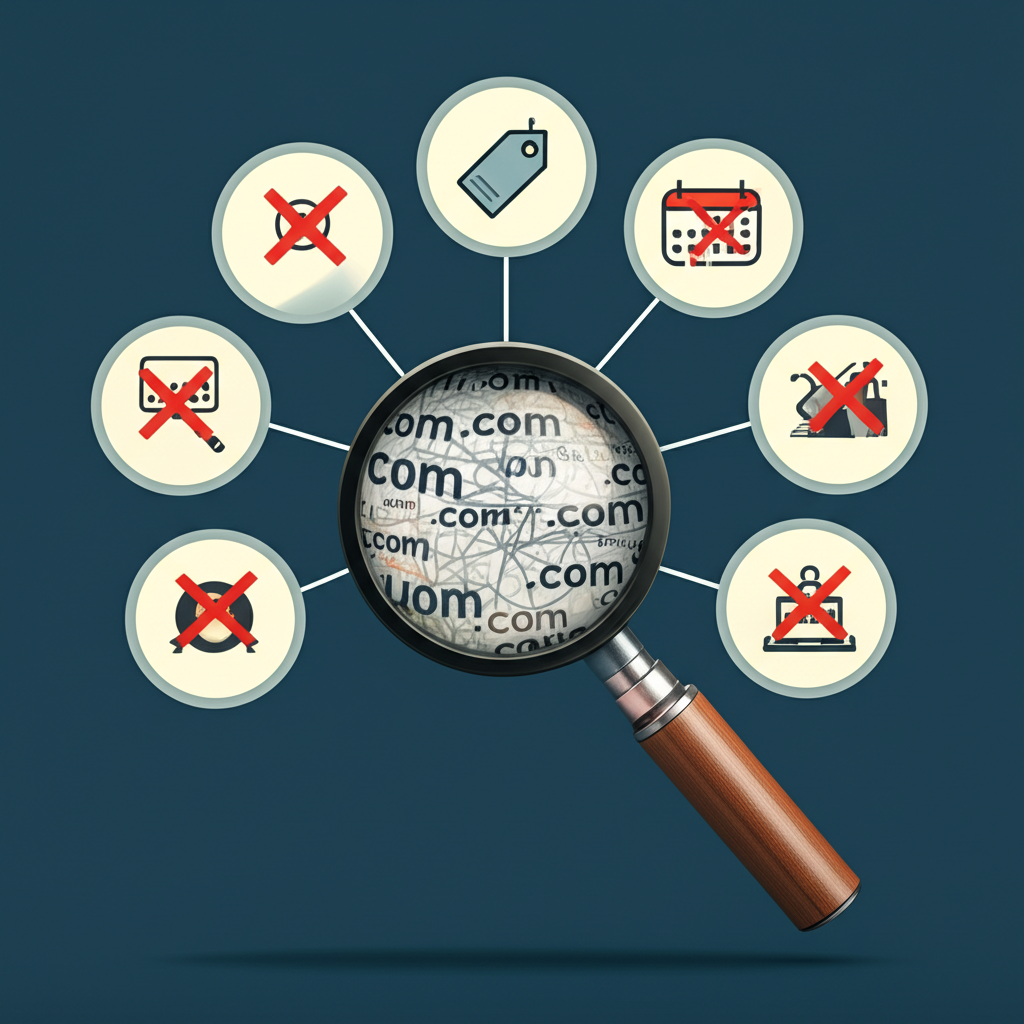- Why is Choosing the Right Domain Name So Important?
- Factors to Consider When Choosing Your Domain Name
- Relevance to Your Brand or Business
- Keep it Short and Memorable
- Easy to Spell and Pronounce
- Keyword Inclusion (Domain Name and SEO)
- Domain Name Extensions: Choosing the Right One
- Availability and Avoiding Trademark Infringement
- Domain Name Generators: A Helpful Tool
- Where to Register Your Domain Name
- Securing Your Domain Name: Beyond Registration
- Domain Privacy Protection
- Automatic Renewals
- Two-Factor Authentication
- Long-Term Strategy: Thinking Ahead with Your Domain Name
- Brand Consistency
- Scalability
- Avoiding Trends
Domain Name: Your Ultimate Guide to Choosing the Perfect One
A domain name is your online address, the digital equivalent of a street address for your website. It’s how people find you on the internet, and it plays a crucial role in your online branding and success. Choosing the right domain name is a vital step in establishing your online presence, whether you’re building a business, launching a blog, or creating a portfolio. This comprehensive guide will walk you through the process of selecting the perfect domain name for your needs.
Why is Choosing the Right Domain Name So Important?

Your domain name is often the first impression you make on potential visitors. A well-chosen domain name can enhance your brand credibility, improve search engine optimization (SEO), and make it easier for people to remember and share your website. Conversely, a poorly chosen domain name can confuse visitors, damage your brand image, and hinder your online growth.
Factors to Consider When Choosing Your Domain Name
Selecting the perfect domain name requires careful consideration of several key factors:
Relevance to Your Brand or Business
Your domain name should clearly reflect your brand or the purpose of your website. If you’re selling handmade jewelry, for example, your domain name should ideally relate to jewelry, craftsmanship, or your brand name. This helps potential customers understand what you offer and strengthens your brand identity.
Keep it Short and Memorable
Shorter domain names are generally easier to remember and type, reducing the risk of typos and lost visitors. Aim for a domain name that is concise and easy to recall. Avoid using complex words, hyphens, or numbers unless absolutely necessary.
Easy to Spell and Pronounce
Choose a domain name that is easy to spell and pronounce, especially if you plan to rely on word-of-mouth marketing. Avoid using words with multiple spellings or pronunciations that could confuse potential visitors.
Keyword Inclusion (Domain Name and SEO)
While exact-match keywords in domain names are no longer the SEO powerhouses they once were, relevant keywords can still be beneficial. Incorporating a keyword related to your industry or niche can subtly improve your search engine rankings and help users understand your website’s focus. However, prioritize brandability and clarity over keyword stuffing.
Domain Name Extensions: Choosing the Right One
The domain name extension, also known as the top-level domain (TLD), is the suffix at the end of your domain name (e.g., .com, .org, .net). The most common TLD is .com, often considered the most credible and recognizable. However, other TLDs like .org (for organizations), .net (for networks), and country-code TLDs (e.g., .uk, .ca) can be suitable depending on your target audience and website purpose.
Availability and Avoiding Trademark Infringement
Before settling on a domain name, check its availability. Use a domain name registrar’s website to see if the name is already registered. Also, conduct a thorough trademark search to ensure you’re not infringing on any existing trademarks.
Domain Name Generators: A Helpful Tool
If you’re struggling to come up with domain name ideas, domain name generators can be a valuable resource. These tools suggest available domain names based on keywords you provide, helping you explore different options and find inspiration.
Where to Register Your Domain Name
Once you’ve chosen your perfect domain name, you’ll need to register it through a domain name registrar. Popular registrars include GoDaddy, Namecheap, and Google Domains. Compare pricing and features before making a decision.
Securing Your Domain Name: Beyond Registration
Registering your domain name is only the first step. Consider these crucial aspects of domain name security:
Domain Privacy Protection
This service masks your personal contact information in the public WHOIS database, protecting you from spam, unwanted solicitations, and potential identity theft.
Automatic Renewals
Set up automatic renewals to prevent your domain name from expiring accidentally, which could lead to losing your online presence.
Two-Factor Authentication
Enable two-factor authentication for your registrar account to add an extra layer of security and prevent unauthorized access.
Long-Term Strategy: Thinking Ahead with Your Domain Name
Your domain name represents a significant investment in your online identity. Consider these long-term strategic points:
Brand Consistency
Maintain consistent branding across your domain name, social media handles, and other online platforms to reinforce your brand identity.
Scalability
Choose a domain name that can accommodate future growth and expansion of your website or business.
Avoiding Trends
While it can be tempting to incorporate trendy terms, focus on a timeless domain name that will remain relevant for years to come.
By carefully considering these factors and following the steps outlined in this guide, you can choose a domain name that sets your online presence up for success, contributing to a strong and memorable brand identity. Remember, your domain name is more than just a web address—it’s a crucial component of your online brand and a key to unlocking your online potential.















Leave a Reply